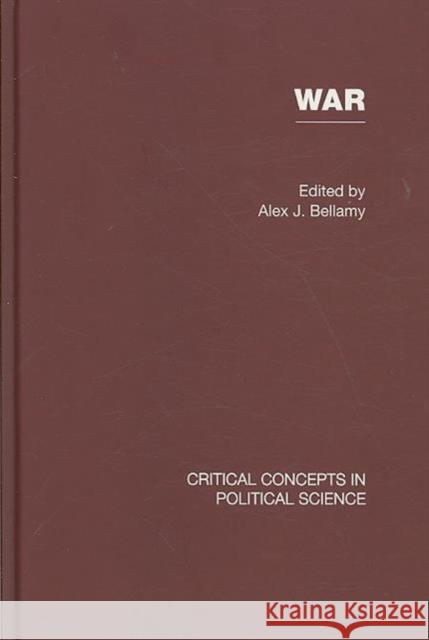War » książka
War
ISBN-13: 9780415433198 / Angielski / Twarda / 2008 / 1544 str.
Contrary to the optimistic predictions at the turn of the last century about the demise of major war, the War on Terror, major civil wars in sub-Saharan Africa and elsewhere, and the continuing conflict in the Middle East suggest that the study of warfare has never been so urgent. War stubbornly remains the ulimate arbiter of international disputes and continues to be a prominent feature of contemporary life: over one hundred states currently have forces overseas in one form of operation or another, and the United States, Britain, and France collectively have over 200,000 soldiers deployed in Iraq, Afghanistan, Lebanon, Cote d Ivoire, Bosnia, Kosovo, Chad, Burundi, Sierra Leone, and Haiti. (In 2006 alone, the UN Security Council passed nearly fifty resolutions relating to armed conflicts around the world.) But those interested in understanding why, how, and with what effect wars are fought are confronted by a bewildering range of theories, narratives, and cases, and a burgeoning amount of scholarly research. The sheer scale and diversity of war scholarship makes this new Routledge Major Work especially timely and welcome. It answers the need for a wide-ranging collection to make sense of the great variety of perspectives and approaches from which social scientists and other thinkers have understood, and continue to understand, war. The collection is organized into four volumes. Volume I ( Nature of War ) explores the nature of war and addresses fundamental questions such as: what is war? And, what marks it out from other forms of violence? Volume I also contains material about the different types of war, the incidence of war, the causes of war, and how wars end. Volume II ( History of War ) collects material on the historical development of war in different eras. The selected materials have been carefully chosen from across history to shed light on a common set of issues and to permit comparison across different eras. Volume III ( Strategies of War ) focuses specifically on military strategy. The material collected here includes the main ideas of the most important strategic thinkers in history, together with learned commentaries on them. Key research on contemporary and future strategy is also included. Finally, Volume IV ( Ethics and Laws of War ) brings together the best and most influential scholarship in four sections: Contending Ethical Traditions, Recourse to Force, Conduct of War, and Justice after War . With a full index, together with introductory material, newly written by the editor, which places the collected material in its historical and intellectual context, War is an essential work of reference. It is destined to be valued by scholars, students, and practitioners of war and defence studies as well as those working in allied disciplines such as security studies, international relations, politics, international law, and history as a vital research resource."
Contrary to the optimistic predictions at the turn of the last century about ‘the demise of major war’, the War on Terror, major civil wars in sub-Saharan Africa and elsewhere, and the continuing conflict in the Middle East suggest that the study of warfare has never been so urgent. War stubbornly remains the ulimate arbiter of international disputes and continues to be a prominent feature of contemporary life: over one hundred states currently have forces overseas in one form of operation or another, and the United States, Britain, and France collectively have over 200,000 soldiers deployed in Iraq, Afghanistan, Lebanon, Cote d’Ivoire, Bosnia, Kosovo, Chad, Burundi, Sierra Leone, and Haiti. (In 2006 alone, the UN Security Council passed nearly fifty resolutions relating to armed conflicts around the world.)
But those interested in understanding why, how, and with what effect wars are fought are confronted by a bewildering range of theories, narratives, and cases, and a burgeoning amount of scholarly research. The sheer scale and diversity of war scholarship makes this new Routledge Major Work especially timely and welcome. It answers the need for a wide-ranging collection to make sense of the great variety of perspectives and approaches from which social scientists and other thinkers have understood, and continue to understand, war.
The collection is organized into four volumes. Volume I (‘Nature of War’) explores the nature of war and addresses fundamental questions such as: what is war? And, what marks it out from other forms of violence? Volume I also contains material about the different types of war, the incidence of war, the causes of war, and how wars end.
Volume II (‘History of War’) collects material on the historical development of war in different eras. The selected materials have been carefully chosen from across history to shed light on a common set of issues and to permit comparison across different eras. Volume III (‘Strategies of War’) focuses specifically on military strategy. The material collected here includes the main ideas of the most important strategic thinkers in history, together with learned commentaries on them. Key research on contemporary and future strategy is also included.
Finally, Volume IV (‘Ethics and Laws of War’) brings together the best and most influential scholarship in four sections: ‘Contending Ethical Traditions’, ‘Recourse to Force’, ‘Conduct of War’, and ‘Justice after War’.
With a full index, together with introductory material, newly written by the editor, which places the collected material in its historical and intellectual context, War is an essential work of reference. It is destined to be valued by scholars, students, and practitioners of war and defence studies—as well as those working in allied disciplines such as security studies, international relations, politics, international law, and history—as a vital research resource.











